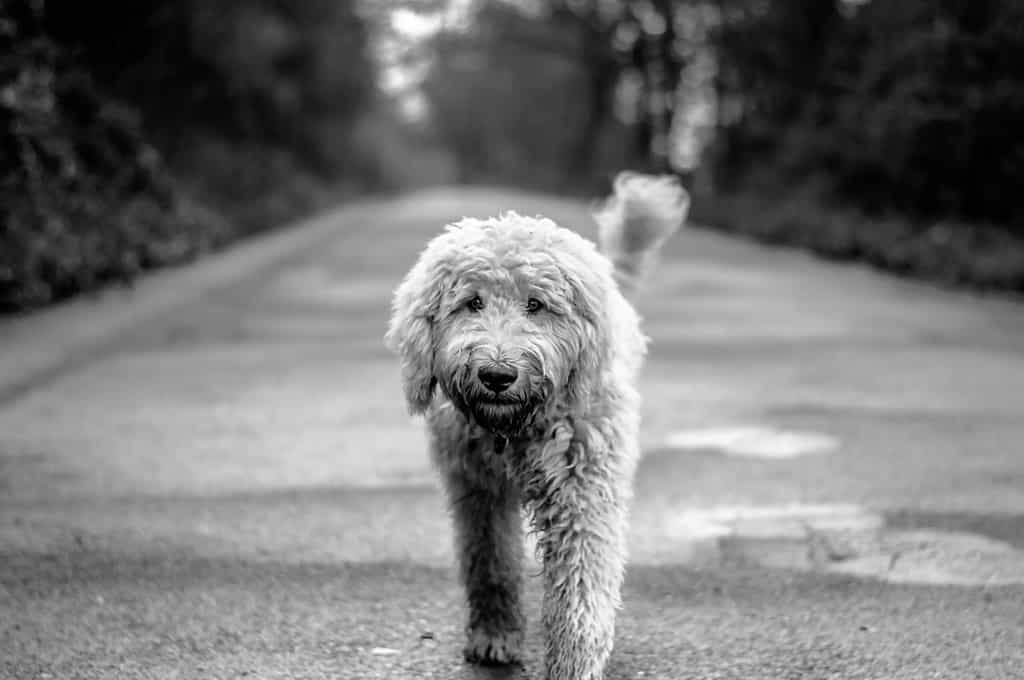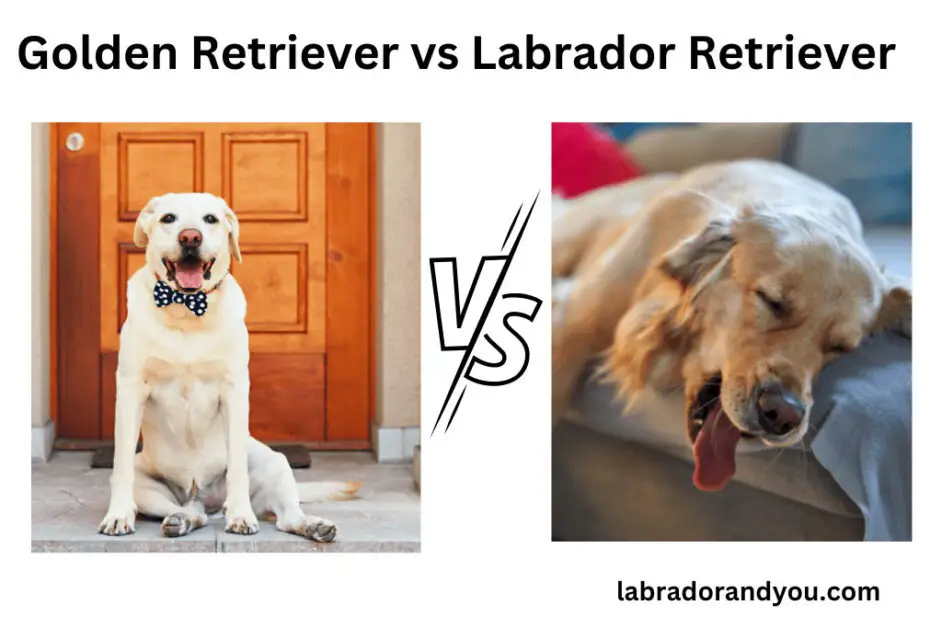Distinct in lineage, Labradoodles and Goldendoodles come from diverse parent breeds. A Labradoodle offspring springs from a Labrador Retriever and either a Toy, Miniature, or Standard Poodles. Conversely, a Goldendoodle descends from a union of a Golden Retriever and any type of Poodle.
Whether you’re a novice dog owner or a seasoned enthusiast, brace yourself for an exciting Goldendoodle vs Labradoodle comparison! Designer dog breed is really fascinating!
difference between goldendoodle and labradoodle
Goldendoodles
Known for its friendly and gentle nature, Goldendoodle is often sought after as a family dog, like a purebred Golden Retriever or Labrador Retrievers. They tend to be highly intelligent breeds and are trainable dogs.
They exhibit a low-shedding double coat, making them suitable for individuals suffering from itchiness from allergies. With their friendly personalities, Goldendoodles thrive in family environments and are great with children.

Labradoodles
On the other hand, Labradoodles are a mix between a Labrador Retriever and Standard Poodles. Labradoodles are known for their playful and outgoing nature. They are often energetic and require regular exercise and mental stimulation.
Labradoodles can have different coat types, including curly, wavy, or straight, and their shedding level may vary. They are friendly dogs and usually get along well with children and other pets.

difference between labradoodle and goldendoodle
| Characteristic | Goldendoodle | Labradoodle |
|---|---|---|
| Parentage | Golden Retriever + Poodle | Labrador Retriever + Poodle |
| Adult Coat | Wavy, curly, less likely to shed | Wavy, curly, less likely to shed |
| Color Varieties | Cream, Gold, Red, Black, Brown, Gray | Black, Chocolate, Cream, Gold, Red |
| Size Differences | Miniature, Medium, and Standard | Miniature, Medium, and Standard |
| Temperament | Friendly, Intelligent, Outgoing, Loyal | Friendly, Intelligent dog breeds, Energetic, Outgoing |
| Lifespan | 10-15 years | 10-15 years |
| Health Concerns | Hip dysplasia, eye diseases, heart disease | Hip dysplasia, eye diseases, elbow dysplasia |
| Exercise Needs | High, loves walks and play | High, needs regular exercise and mental stimulation |
| Grooming | Regular brushing to prevent matting | Frequent brushing to prevent matting |
| Training | Highly trainable, responds well to positive reinforcement | Highly trainable, energetic and eager to please |
| Good with Kids | Yes | Yes |
| Good with Other Pets | Generally yes | Generally yes |
History: golden vs labradoodle
History of Goldendoodles
The precise origins of the hypoallergenic Goldendoodle breed remain a mystery, but crossbreeding purebred Poodles and Golden Retrievers can be traced back to 1969. Monica Dickens, the great-granddaughter of Charles Dickens, is credited with breeding them. However, this furry family popularity surged in the 1990s.
Subsequently, the following years witnessed a tremendous surge in the popularity of hybrid dogs. Crossing poodles with other dog breeds resulted in numerous “doodle” variations. Among the first to gain prominence was the Goldendoodle.
While there is an ongoing debate about the breed’s original developer due to the absence of official registration, this Golden Retriever and Poodle mix gained rapid popularity by the mid-1990s.
However, Goldendoodles cannot be registered with the American Kennel Club (AKC) as they are not recognized as purebred. However, you can register them through the AKC Canine Partner program.
History of Labradoodles
Since 1989, the Australian Labradoodle breed has been developed by Wally Conron, an employee at the Royal Guide Dog Association of Australia. He responded to a special request for a non-shedding guide dog from a blind woman in Hawaii whose husband had allergies.
Conron carefully crossed a Labrador Retriever, known for its proud lineage and stable temperament, with a Poodle parent breed with nonshedding coats and stable genetics. This successful combination, resulting in an Australian Labradoodle, has gained popularity, especially in the United States.
Labradoodles are not acknowledged as a breed by North America’s American Kennel Club and other significant kennel club associations.
labradoodles vs goldendoodle: Caring for Your Doodle Dog
Nutritional Needs
| Dog Breed | Dietary Needs | Recommendations |
|---|---|---|
| Goldendoodle | Consult a vet for food type, portion standard sizes, and frequency. Considerations include age, size, and activity level. | A well-balanced diet requires high-quality dog food with real meat, vegetables, and whole grains. |
| Labradoodle | Vet consultation is required for determining dietary needs based on age, size, and activity level. | A well-balanced diet of high-quality dog food that provides protein, healthy fats, and carbohydrates. |
Feeding Schedule
| Dog Breed | Puppy Feeding Schedule | Adult Feeding Schedule |
|---|---|---|
| Goldendoodle | Puppies need frequent meals, about three to four times daily, for growth and development. | Adult Goldendoodles can be transitioned to a twice-daily feeding schedule for proper nourishment. |
| Labradoodle | Labradoodle puppies should be fed more frequently, typically three to four times daily, due to high energy levels and nutritional needs. | As Labradoodles mature, their feeding schedule can be adjusted to twice daily to promote healthy digestion. |
Portion Control
| Dog Breed | Weight Management | Exercise and Health Check |
|---|---|---|
| Goldendoodle | Monitor food intake to prevent obesity. Adjust portions according to weight and activity level. | Regular health checks are vital. Consult a vet for any weight-related concerns. |
| Labradoodle | Labradoodles are prone to weight gain if overfed. Carefully measure their food portions. | Avoid free-feeding. Provide regular exercise, like daily walks, to maintain a healthy weight. |
Hydration and Dental Care
These two breeds always require access to fresh and clean water to stay properly hydrated. Incorporate regular teeth brushing and consider dental treats or toys to promote good oral hygiene.
golden doodle vs labradoodle: Grooming
Regular Brushing
| Dog Breed | Grooming Frequency | Benefits of Regular Brushing |
|---|---|---|
| Goldendoodle | Brush hair twice to three times weekly. | Regular brushing helps to remove tangles and debris, ensuring a beautiful and manageable coat. |
| Labradoodle | Regular brushing is needed, around two to three times per week. | Brushing aids in preventing matting and keeps their coat in good condition, especially during shedding seasons. |
Professional Grooming:
| Dog Breed | Professional Grooming Frequency | Benefits of Professional Grooming |
|---|---|---|
| Goldendoodle | Recommended every 6 to 8 weeks due to their long and dense coats. | Groomers can trim and shape their fur according to desired styles, maintaining a manageable coat length. |
| Labradoodle | Beneficial every 6 to 8 weeks to maintain a neat appearance. | Professional grooming ensures proper hygiene and coat maintenance. |
Bathing:
| Dog Breed | Bathing Frequency | Bathing Recommendations |
|---|---|---|
| Goldendoodle | Bathe every 4 to 6 weeks with a gentle dog shampoo. | Overbathing should be avoided to preserve their natural oils, which are crucial for coat health. |
| Labradoodle | Bathe every 4 to 6 weeks, or as needed, using a gentle dog shampoo. | Like Goldendoodles, it’s important not to over-bathe Labradoodles to maintain the health condition of their coat. |
Ear Care:
| Dog Breed | Ear Care | Maintenance & Prevention |
|---|---|---|
| Goldendoodle | Regularly inspect and clean ears to prevent infections. | Use a dog-specific ear cleaner and gentle wiping to maintain ear hygiene. |
| Labradoodle | Labradoodles, especially with floppy ears, require regular ear care. | Regularly check and gently clean their ears to avoid potential infections. |
Nail Trimming:
| Dog Breed | Nail Care Importance | Maintenance Recommendation |
|---|---|---|
| Goldendoodle | Proper nail length is essential for their comfort and well-being. | Regular trimming is necessary to prevent discomfort and gait issues. |
| Labradoodle | Regular nail care is crucial for maintaining mobility and preventing discomfort. | Trim their nails regularly to maintain proper length and avoid discomfort. |
full grown labradoodle vs goldendoodle
Goldendoodle
Goldendoodles, like other cross-breeds, exhibit a range of appearances that can differ from one individual to another. These variations manifest in terms of size, coat type, and color. The size of a Goldendoodle falls between that of its purebred poodle and golden retriever parent breeds.
There are three categories: standard, medium, and miniature (if the poodle parent breed is miniature). Some standard-sized Goldendoodles have been known to weigh over 100 pounds.
However, a standard Goldendoodle weighs around 45 pounds or more upon reaching adulthood. Medium-sized dog Goldendoodles weigh between 30 and 45 pounds, while mini Goldendoodles weigh approximately 15 to 30 pounds.
A male Goldendoodle generally measures around 24 to 26 inches at the shoulder, while females typically weigh 22 to 23 inches. However, some Goldendoodles can grow as tall as 28 to 29 inches.
Taller goldendoodles that inherit more characteristics from the golden retriever side of the family tend to be more robust and have a higher weight. A stocky goldendoodle of this type can surpass 90 pounds. It is pretty common for Goldendoodles to inherit the distinctive “golden retriever bump” on top of their heads.

Labradoodle
Labradoodles are incredibly adorable at first sight, with their beautiful curly coats, endearing eyes, and overall appealing physique. However, if you’re considering breeding Labradoodles, several other crucial aspects must be considered.
One significant factor is their size, which can vary due to their mixed-breed nature. There are three common types of Labradoodles, each with a variety of sizes range for males and females:
- Standard: Height falls between 22-24 inches, with a weight range of 50-65 pounds for both genders.
- Medium: Usually ranging from 18-20 inches in height, a medium Labradoodle weighs around 30-45 pounds.
- Mini: With a height range of 14-16 inches, these miniature poodle mixes weigh approximately 15-25 pounds.
Regarding the perfect Labradoodle physique, there are several defining characteristics to consider. First and foremost, the topline is level with the croup and supported by a strong loin. This alignment contributes to the overall balance and structure of the dog.
Labradoodles possess well-developed sprung ribs. These ribs provide flexibility and support to the body, allowing for efficient movement and agility. Firm elbows are another critical aspect, indicating strength and resilience.
The legs of a Labradoodle are slightly longer, which adds to their graceful and elegant gait. This feature complements their galloping nature, enhancing their agility and speed.

goldendoodle versus Labradoodle Toilet Training Techniques
| Training Aspect | Goldendoodles | Labradoodles |
|---|---|---|
| Primary intelligence difference | These dogs are intelligent breeds and easy to train, especially in toilet training, similar to a Golden Retriever. | Labradoodles also possess high intelligence and trainability, making them receptive to toilet training methods. |
| Consistency and Routine | Establishing a consistent routine is vital for successful toilet training. Regular bathroom breaks and positive reinforcement are key. | Labradoodle puppies respond well to consistent routines. A schedule for bathroom breaks and rewarding proper elimination aids in toilet training. |
| Positive Reinforcement | Positive reinforcement works effectively with Goldendoodles. Praising and rewarding desired behavior encourages good toilet habits. | Labradoodles also thrive on positive reinforcement. Consistent praise, affection, and rewards reinforce proper elimination habits. |
| Patience and Persistence | Consistent training, combined with patience and persistence, yields positive results. | Similar to Goldendoodles, patience and persistence are essential. |
labradoodle vs golden doodle Temperament
Energy Levels:
Goldendoodles have a slightly calmer energy level compared to Labradoodles. They are more inclined to enjoy leisurely activities, whereas Labradoodles have a higher need for physical exercise.
Sociability:
Goldendoodles tend to be more tolerant and easygoing with strangers, making them well-suited for households with frequent visitors. Labradoodles tend to be more reserved initially but warm up quickly to new people.
Compatibility with Children and Other Pets:
These two breeds are generally good with children and other animals when properly socialized. However, Goldendoodles may exhibit a slightly more patient and gentle demeanor, while Labradoodles may have a playful and boisterous approach.

Goldendoodle Vs Labradoodle Furnishings and Snouts
Breed Standards: Furnishings
| Dog Breed | Coat Texture | Furnishing Characteristics | Coat Colors |
|---|---|---|---|
| Goldendoodle | Can be wavy, curly, or straight. | Known for long, flowing hair on their ears, chest, and tail. | Coat colors range from cream, gold, apricot to red. |
| Labradoodle | Possesses a variety of coat types, including woolly or fleece. Can be straight, wavy, or curly. | Typically have less hair around their faces compared to Goldendoodles. | Exhibits different patterns and colors, such as chocolate, black, or caramel. |
Breed Standards: Snouts
| Dog Breed | Snout Characteristics | Facial Features | Snout Variation Factors |
|---|---|---|---|
| Goldendoodle | Tend to have longer and narrower snouts resembling Golden Retrievers. | Facial features often reflect their Golden Retriever lineage. | Snout length can vary depending on the generation and individual physical traits. |
| Labradoodle | Generally have broader snouts that resemble Labrador Retrievers. | Retain certain Labrador Retriever features, such as wide-set eyes and strong jaws. | Snout shape can vary based on the generation and the influence of the Poodle gene. |
Activity Level: Goldendoodle Labradoodle
Goldendoodle
- They possess a moderate to high activity level, requiring regular exercise to stay mentally and physically stimulated.
- Daily walks, interactive play sessions, and mental challenges such as puzzle toys or obedience training are essential to keep them content.
Labradoodle
- They also exhibit a moderate to high activity level and thrive in an environment that offers plenty of physical and mental stimulation.
- Activities like fetching, swimming, running, or agility training help meet their exercise needs.
Goldendoodle vs Labradoodle: Exercise Considerations
Labradoodles and Goldendoodles benefit from engaging in activities that provide mental stimulation and physical exercise. Adequate exercise can help prevent behavioral issues, such as excessive barking or destructive behavior when their energy is not channeled correctly.
Individual dogs may have varying exercise requirements, influenced by age, health, and temperament.
Lifespan and Health Issues of Goldendoodle Vs Labradoodle
Goldendoodle
- Patellar Luxation: A condition where the kneecap temporarily dislocates from its normal position.
- Hypoadrenocorticism (Addison’s Disease): A hormonal disorder characterized by insufficient production of adrenal hormones.
- Hyperadrenocorticism (Cushing’s Disease): A condition where the adrenal glands produce excessive cortisol.
- Hip Dysplasia: An abnormal hip joint formation that can lead to pain and mobility issues.
- Thyroid Issues: Imbalances in thyroid hormone levels can affect metabolism and overall health.
- Skin Conditions: Golden Retrievers are prone to dog allergies and various skin problems.
- Ear Infections: Golden Retrievers have floppy ears that can trap moisture, leading to frequent infections.
Labradoodle Common Health Issues
Ear Issues:
Labradoodles are prone to ear problems inherited from Labradors and Poodles. Look for any unusual smell from their ears, which could indicate an infection.
Epilepsy:
Epilepsy occurs more frequently in this dog breed compared to others. Watch for symptoms like walking difficulties, confusion, falling, or loss of consciousness. Seek immediate veterinary care if these signs appear.
Hip and Elbow Issues:
Hip and elbow dysplasia, where bones improperly connect with joints, can cause discomfort, pain, lameness, and mobility loss. Ensure that the Labradoodle’s parent breeds have no evident hip or elbow problems to prevent inherited issues.
Allergy Sufferers:
Labradoodles are prone to dog allergies despite being bred as hypoallergenic. Dietary changes and medication can help manage symptoms. These allergic reactions are common, so monitor their diet, prevent table scraps or trash access, and limit exposure to potential irritants causing food allergy.
Addison’s Disease:
Labradoodles may inherit Addison’s disease, a hormonal disorder affecting cortisol levels. Look for weakness, tiredness, weight loss, shaking, and other symptoms. Hormone replacement treatments are necessary for managing the condition throughout the dog’s life expectancy.
Labradoodles live for around 12-15 years, while well-bred Goldendoodles generally have a life expectancy of 10-15 years. Both can get retinal atrophy.

labradoodle vs goldendoodle shedding
| Coat Type | Dog Breed | Heritage Influence | Shedding & Allergenic Properties | Coat Characteristics & Grooming Needs |
|---|---|---|---|---|
| Straight, Flat, Wavy-Coated | Goldendoodle | A glimpse of the Golden Retriever’s ancestry. | Moderate shedding with minimal grooming needs. Second or third-generation dogs are likely to shed even less. | Coat texture ranges from straight coat to wavy, especially in first-generation Goldendoodles. |
| Curly-Coated | Goldendoodle | Influence from the Poodle heritage. | Hypoallergenic and non-shedding coat. | Luxurious, tight curls that require regular grooming. |
| Hair-Coated | Labradoodle | Reflecting the Labrador Retriever lineage. | Minimal shedding with frequent daily brushing. | Straighter, hair-like coat texture. |
| Fleece-Coated | Labradoodle | Inherited from both Poodle and Labrador Retriever. | Hypoallergenic and low-shedding. | Soft, wavy, or curly fleece that necessitates regular grooming. |
| Wool-Coated | Labradoodle | Strong Poodle influence. | Highly hypoallergenic and minimal shedding shaggy coat. | Thick, dense, and tightly curled wool-like coat, giving a teddy bear look. |
Goldendoodle vs. Labradoodle color
When it comes to coat colors, Goldendoodles can display a variety of shades. The most common colors include white, cream, apricot, gold, and red. However, they can also be black or have a light sandy brown hue. The coloration of a Goldendoodle’s coat can vary significantly between individuals.
Labradoodles come in variety of colors, including solid shades and party colors. Labradoodles exhibit a range of coat colors, from white to cream, with cream/gold tones being more vibrant. Apricot coats may fade or darken.
True red is deep, while chocolate can be dark or light. Black usually remains true, but silver/blue genes can cause fading. Parti-colored coats Labradoodles have a white base with large patches of another color.
Other Poodle Mix Breed Comparisons to Consider
Cockapoo
The result of the Cocker Spaniel and Poodle mix. Often characterized by their affectionate and friendly nature. They Possess different coat types, such as curly, wavy, or straight.
Bernedoodle
A delightful blend of a poodle and a Bernese Mountain Dog, resulting in an enchanting crossbreed. They are known for their loyal and friendly disposition. These beautiful canines can exhibit various coat patterns, such as tri-color and bi-color variations.
Schnoodle
A crossbreed of a poodle and a Schnauzer. With their intelligence and trainable nature, they prove to be excellent companions for obedience training. They possess a wiry or curly coat.

What Are The Benefits Of Doodle Popular Dog Breeds
Hypoallergenic Coats
- Doodle breeds often inherit the Poodle’s hypoallergenic coat, making them suitable for people with allergies.
- Unlike purebred parents with high-shedding coats, their low-shedding fur reduces your home’s allergens risk.
Versatile Companions
- Doodles come in variety of sizes, ranging from miniature to standard, making them adaptable to different lifestyles and living spaces.
- They are known for their friendly and sociable nature, making them great companions for individuals, families, and other pets.
Therapy and Service Dogs
- Doodles are gentle and intuitive, making them excellent therapy and service dog.
- Their calm temperament and intelligence enable these therapy dogs to comfort and assist those in need.
Goldendoodle vs Labradoodle: Which Breed is Right for You?
The Labradoodle and Goldendoodle are immensely popular breeds thanks to their outgoing personalities and hypoallergenic coats. Both designer breeds make excellent family pets. Goldendoodles are known for their friendly nature and intelligence, making them an excellent choice for active families.
On the other hand, Labradoodles are praised for their playful demeanor and loyalty. Consider your lifestyle, living arrangements, and preferences to choose a Goldendoodle or Labradoodle. Always choose from registered, trustworthy and an ethical breeder or rescue centers.
FAQ: Goldendoodle vs Labradoodle
Are Goldendoodles or Labradoodles better with Separation anxiety?
Both Goldendoodles and Labradoodles are great for separation anxiety, but individual temperament may vary.
Is One Stinkier Than The Other?
Neither dog breed is stinkier than the other; proper grooming and hygiene keep them fresh.
Are Labradoodle or Goldendoodle Dogs Hypoallergenic?
Both Goldendoodles and Labradoodles are considered hypoallergenic due to their low-shedding coats.
Which Doodle makes a better family pet?
Both Doodle dogs make great family friendly dogs, bringing love, joy, and endless tail wags to your home. Their sunny personalities light up your day.
How Much Exercise Do They Need?
These active breeds require regular exercise to stay happy and healthy, around 30-60 minutes daily.
Can These Be Excellent Guard Dogs?
While not natural guard or rescue dogs, Goldendoodles and Labradoodles can be trained to alert and protect their families.
Where to Find a Labradoodle or Goldendoodle?
You can find Labradoodles or Goldendoodles through reputable breeders, shelters, or adoption agencies.
Which one sheds less, the Labradoodle or Goldendoodle?
Both Goldendoodles and Labradoodles are low-shedding, but individual variation exists. Regular grooming helps minimize shedding.
What are the energy requirements of a Goldendoodle Vs Labradoodle?
Goldendoodles and Labradoodles have similar energy requirements, requiring daily exercise and mental stimulation.
which is better for allergies goldendoodle or Labradoodle?
Both Goldendoodles and Labradoodles are considered to be good for people with allergies, as they are both low-shedding dogs. However, there is no guarantee that either breed will be completely hypoallergenic for everyone. Some people with allergies may still experience symptoms around Goldendoodles or Labradoodles, especially if they have a severe allergy.
Author Profile
- Site Owner And Dog Lover
-
Aritra, the founder of Labradorandyou.com, is a lifelong dog lover whose passion ignited for Labradors for their loyalty and intelligence. With extensive research and personal experiences, Aritra has become a Labrador expert, offering a rich resource on the breed. Labradorandyou.com provides reliable, timely, and evidence-based information, including Labrador-specific product reviews, training techniques, and care tips.
Labradorandyou.com was born out of Aritra's passion and his desire to share his profound knowledge about the breed. The site serves as a comprehensive resource, offering a wealth of up-to-date information for Labrador owners and enthusiasts alike
Also by the author
-
 Lab-TypesNovember 17, 2023Old Dog Seizures: Causes, Symptoms, and Treatment Options
Lab-TypesNovember 17, 2023Old Dog Seizures: Causes, Symptoms, and Treatment Options
-
 Lab-TypesNovember 17, 2023Why Is My Dogs Poop Yellow? 8 Reasons & Solutions
Lab-TypesNovember 17, 2023Why Is My Dogs Poop Yellow? 8 Reasons & Solutions
-
 ReviewsNovember 17, 2023The Only Hill’s Science Diet Review You Need To Read
ReviewsNovember 17, 2023The Only Hill’s Science Diet Review You Need To Read
-
 Lab-TypesNovember 17, 2023How To Adopt An Emotional Support Dog?
Lab-TypesNovember 17, 2023How To Adopt An Emotional Support Dog?





